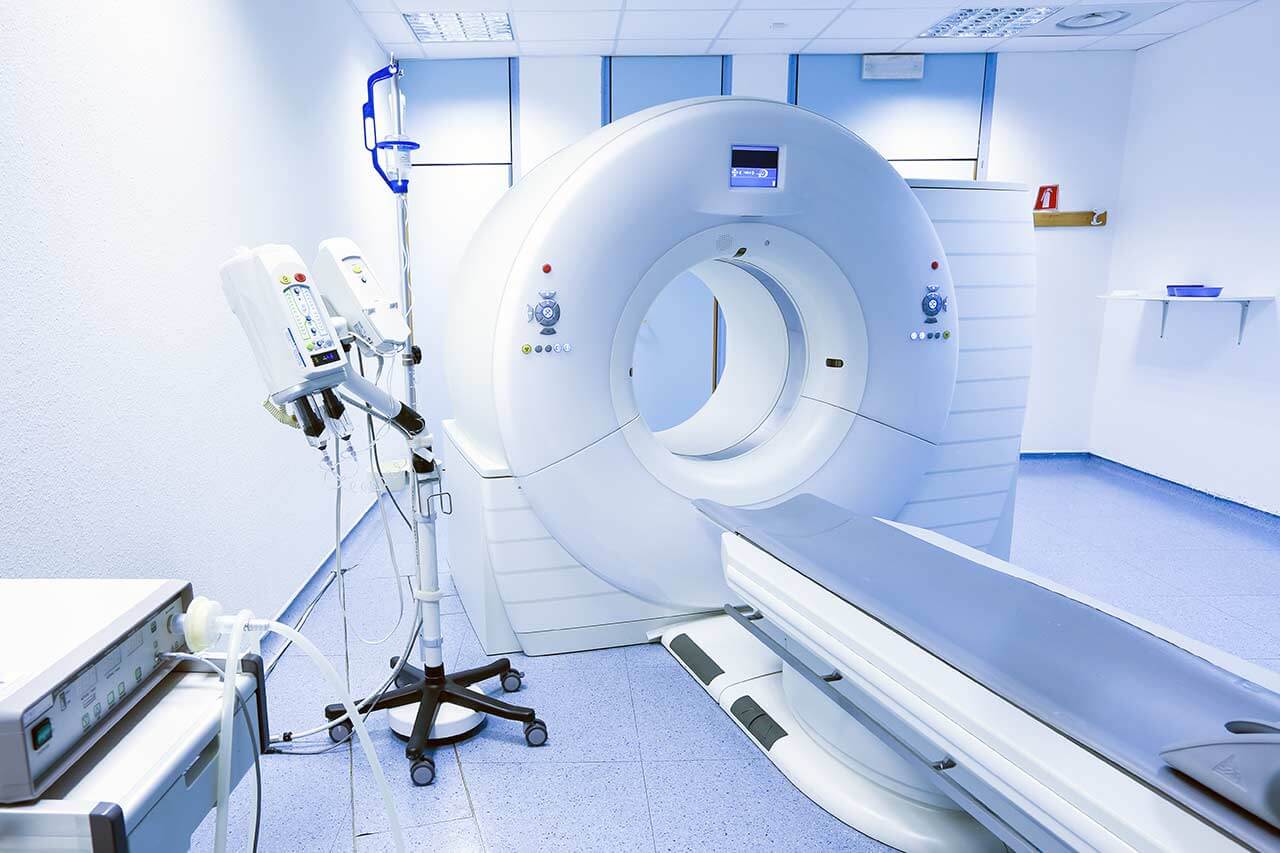
The program includes:
- Initial presentation in the hospital
- Clinical history taking
- Evaluating the available medical reports
- General clinical examination
- Urological examination
- Laboratory tests:
- Complete blood count
- Biochemical analysis of blood
- Inflammation indicators (CRP, ESR)
- Indicators of blood coagulation
- Tumor markers, PSA
- Ultrasound scan of the urogenital system
- CT scan/MRI of the abdomen and pelvis
- Preoperative care
- Removal of prostate tumor metastases with a gamma probe
- Consultations of related specialists
- Symptomatic treatment
- Cost of essential medicines
- Nursing services
- Control examinations
- Stay in the hospital with full board
- Accommodation in 2-bedded ward
- Recommendations regarding further treatment
Indications
- Confirmed prostate cancer with suspected metastasizing
How program is carried out
During the first visit, the physician will conduct a clinical examination and go through the results of the available examinations. After that, you will undergo the necessary additional examination, such as the assessment of liver and kidney function, ultrasound scan of the abdominal and pelvic organs. Based on the results, the physician will determine the number and localization of metastases, and plan the upcoming intervention.
On the eve of the intervention, you will receive an injection of radioactively labeled PSMA. PSMA is the substance that binds to the smallest prostate cancer metastases in the lymph nodes and other tissues. The radioactive label will allow the surgeon to find all the metastases during the operation.
Removal of prostate tumor metastases with a gamma probe starts with general anesthesia. After anesthesia, the surgeon makes small incisions through which he inserts endoscopic instruments, a gamma probe and a video camera into the pelvic cavity and abdominal cavity. The gamma probe detects the lymph nodes affected by metastases by a radioactive label, and the surgeon removes them endoscopically. The video camera continuously transmits a three-dimensional image of the operating field in 12-fold magnification to the monitor.
As the surgeon sees the operating field in multiple magnification, he preserves the nerve endings and large blood vessels. This significantly reduces the surgical risks. The gamma probe, in turn, allows detecting and removing all metastases, which minimizes the risk of prostate cancer recurrence.
After the completion of the operation, you will be transferred back to the ward, under the supervision of the attending physician and nursing staff. Due to the minimal invasiveness of the operation and the short duration of general anesthesia, you will not need to stay in the intensive care unit for a long time.
Finally, the attending physician will evaluate the results of control examinations, schedule the date of discharge from the hospital and give you detailed recommendations for further follow-up and treatment.
Required documents
- Medical records
- PSA blood test
- MRI/CT scan (not older than 3 months)
- Bone scintigraphy (if available)
- Biopsy results (if available)
Service
You may also book:
 BookingHealth Price from:
BookingHealth Price from:
About the department
According to the Focus magazine, the Department of Adult and Pediatric Urology at the University Hospital Heidelberg ranks among the top German departments specializing in prostate cancer treatment!
The department offers the full range of diagnostics and treatment of the urinary system in men and boys. The department has a long history, rich traditions, and is also a recognized center of excellence in the treatment of all urological diseases. The department specializes in the treatment of malignant urological diseases, reconstructive surgery, pediatric urology, treatment of urinary tract dysfunction and kidney stone disease. The department treats about 16,000 patients every year, which is an indisputable confirmation of its impeccable reputation.
The department is headed by Prof. Dr. med. Markus Hohenfellner. The doctor began his clinical activity in 1993 after passing his board certification in urology, so today his experience is estimated at tens of years. The primary focuses of the specialist's work are minimally invasive surgery, including robot-assisted interventions using the da Vinci system, and reconstructive surgery. The success of Dr. Markus Hohenfellner's clinical practice is confirmed by numerous awards from the American Urological Association (AUA) and the German Society of Urology (DGU). He is the author and co-author of 250 scientific publications and the editor of three scientific books on urology.
The department has the cutting-edge infrastructure and state-of-the-art medical equipment. For example, minimally invasive techniques are widely used here during operations on the adrenal glands, kidneys, ureters, bladder, prostate, and urethra. The department's specialists also have the advanced surgical system DaVinci, which is used for the surgical interventions of varying severity, for example, for the radical removal of prostate tumors.
The key focus of the department’s clinical activities is the treatment of urological oncopathology. Each clinical case is considered at regular tumor boards, after which doctors from the related disciplines (urologists, radiologists, oncologists, etc.) jointly develop an optimal treatment strategy adapted to the individual needs and wishes of the patient. It is worth noting that due to the active research activities of the department's specialists, it offers unique techniques and drugs, which guarantee positive treatment results.
The main clinical focuses of the department include:
| Diagnostics and treatment of urological diseases in adults |
|
| Diagnostics and treatment of urological diseases in children |
|
| Minimally invasive urology |
|
| Neurourology | |
| Treatment of male infertility | |
| Prevention, diagnostics and treatment of cancers of the genitourinary system in men |
|
| Reconstructive urology |
|
| Other medical services |
Curriculum vitae
Since October 1, 2003, Prof. Markus Hohenfellner is the Head of the Department of Adult and Pediatric Urology at the University Hospital Heidelberg. He succeeded Prof. Dr. med. Gerd Staehler, who headed the department since 1989.
Since 1977 to 1983, the doctor studied human medicine in Innsbruck, at the same time in 1980 and 1981 he underwent training at the Universities of London and Oxford.
After two and a half years of training in General Surgery and two and a half years devoted to nephrological basic researches at the Institute of Physiology, University of Munich, the doctor began specialized training in Urology in the Department of Urology at the Witten/Herdecke University, Wuppertal (1988). In 1993, Prof. Hohenfellner became a Medical Specialist in Urology, and in 1994 a Medical Specialist in Special Urologic Surgery.
In 1990 and 1991, the doctor has a scholarship program in the Department of Urology at the University Hospital San Francisco. His scientific and clinical work became the basis for his doctoral thesis, which he completed in 1994. In the same year, he was appointed as a Senior Physician in the Department of Urology at the University Hospital Wuppertal. Since 1997, the doctor held the position of Senior Consulting Physician in the Department of Urology at the University Hospital Mainz.
The main focuses of scientific and clinical activities of Prof. Hohenfellner include urologic oncology and surgical oncology, minimally invasive and reconstructive urology. Under his leadership, the Department of Urology at the University Hospital Heidelberg covers all fields of modern urology, including prevention, early detection, radical cancer surgery, minimally invasive and robotic surgery, diseases of the urinary system, pediatric urology, treatment of urolithiasis and andrology.
Prof. Hohenfellner is a member of many national and international professional societies, the author and co-author of numerous scientific publications and book chapters, as well as the publisher of two scientific books on urology. He has scientific awards from various national and international urological societies, for example, the Best Thesis Award from the European Society of Urology and the Maximilian-Nitze Prize, the most prestigious award of the German Society of Urology.
Memberships in the Professional Societies
- German Society of Urology.
- Forum Urodynamicum.
- European Association of Urology.
- International Society of Urology.
- American Urological Association.
- Austrian Society of Urology.
- German-Japanese Confederation of Urology.
- Society of Urological Researches.
- German Transplantation Society.
- European Renal Association.
Photo: (с) depositphotos
Sources:
About hospital
According to Focus magazine, the University Hospital Heidelberg ranks among the top five hospitals in Germany!
The hospital is one of the most advanced and reputable medical institutions not only in Germany but throughout Europe. There are more than 43 specialized departments and 13 medical institutes which cover all fields of modern medicine. A distinctive feature of the hospital is the presence of unique therapeutic methods for the treatment of complex and rare clinical cases.
Due to successful clinical practice, the hospital has been holding leading positions in the international medical arena for many years. The basis for this popularity is the combination of the very latest technologies, competent specialists, and active research activities, which allows introducing of revolutionary diagnostic and treatment methods, which save lives.
In addition to the outstanding medical achievements, it is worth noting a particularly friendly and pleasant atmosphere, and respectful attitude towards the patient. Both doctors and nursing staff make every effort to meet all the needs and wishes of the patient, pay due attention to each clinical case, and have personal communication with the patient, which contributes to a positive treatment result.
Photo: (с) depositphotos
Accommodation in hospital
Patients rooms
The patients of the University Hospital Heidelberg live in comfortable single and double rooms designed in bright colors. Each room is equipped with an ensuite bathroom with a shower and toilet. The patient rooms are quite spacious, they have a table with chairs for receiving visitors. Roomy wardrobes are provided for storing personal belongings. It is possible to connect to the Internet. In addition, the hospital offers enhanced-comfort rooms with a safe, refrigerator, and upholstered furniture. Patients have 24-hour access to the services of medical personnel.
Meals and Menus
The patient and his accompanying person have a daily choice of three menus. If you for some reason do not eat all the products, you will be offered an individual menu. Please inform the medical staff about your dietary preferences prior to the treatment.
Further details
Standard rooms include:
Religion
The religious services are available upon request.
Accompanying person
During the inpatient program, an accompanying person may stay with you in a room or hotel of your choice.
Hotel
During the outpatient program, you may live in a hotel of your choice. The managers will help you choose the most suitable options.
The hospital offers a full range of laboratory tests (general, hormonal, tests for infections, antibodies, tumor markers, etc.), genetic tests, various modifications of ultrasound scans, CT scans, MRI and PET / CT, angiography, myelography, biopsy and other examinations. Treatment with medications, endoscopic and robotic operations, stereotaxic interventions is carried out here, modern types of radiation therapy are also used. The hospital offers patients all the necessary therapeutic techniques.
- Endovascular treatment of liver pathologies with LigaSureTM, Ultracision® and Habib®-Sealer devices
- Correction of chest deformities in children (Nass operation)
- Minimally invasive direct coronary artery bypass grafting
- Replacement of ascending aorta (David procedure)
- Operations using the da Vinci robotic system
These are primary lung tumors and metastases in the lungs, benign and malignant liver pathologies, thyroid pathologies, gastroesophageal reflux disease, heart rhythm disturbances and heart failure, infertility, fibromyalgia, damages and pathologies of large joints, polyneuropathy and other diseases.
- Thoracic surgery
- Cardiac surgery
- Urology
- Orthopedics and traumatology
- Obstetrics and gynecology
The hospital's team consists of more than 13,000 highly qualified employees




